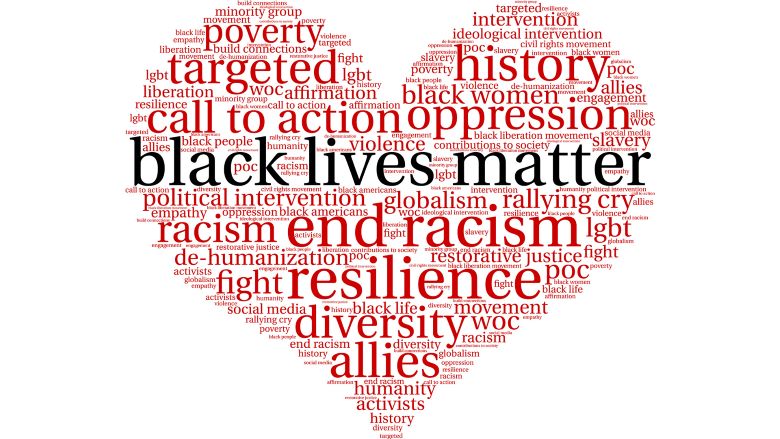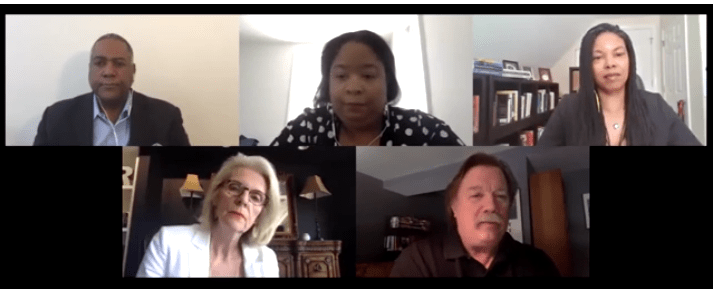Panel: Racial injustice demands action, not just rhetoric
Corporate vows and fleeting public attention make words spoken today, however impassioned, likely to float away unless executives and activists take definite steps to correct imbalances.

Editor’s note: We are re-running the top stories of 2020 as part of our year-end countdown.
As the spotlight turns to institutional racism in corporate America, one salient point emerges: Words matter, but without action they are not nearly enough.
These truths were emphasized by a four-person panel of communicators and crisis experts held Monday, June 8, during the Ragan webinar, “Brands Taking a Stand: Social Purpose + Black Lives Matter.”

The discussion, spurred by the national upheaval over the death of George Floyd at the hands of Minneapolis police officers, transcended societal divides and reached into internal and external messaging—as well as hierarchical structures—at U.S. companies.
“Organizations, based on their values and their ethics and what they were founded upon, have an obligation to say something,” observed Brandi Boatner, social and influencer communications lead for global markets at IBM.
“These are difficult times, but they’re also brand-defining times,” observed Carol Russell, CEO of Russell Herder in Minneapolis. “You have to understand what your values are. I think when organizations get into trouble is when they speak before they have got their own brand story on a solid foundation.”
Silence is leaden
Those who keep mum on such a volatile, high-profile issue run the risk of alienating the public—and their own employees.
“Silence is not an option. You think you’re being silent, but you’re speaking loudly,” said Ayanna Robinson, executive vice president for reputation management at Porter Novelli. “You may actually be making the opposite statement of what you want to say.”
Empty rhetoric doesn’t cut it, of course.
“You have to back it up,” Robinson added. She said many organizations say they support the black community, but then they aren’t taking the necessary steps.
“We [communicators] need to keep this at the forefront,” she said. “We need to push internally; we need to push externally.”
A lot of leaders are white and male, Robinson said, and once a high-profile issue fades, “they go back into their bubbles, and they’re comfortable again. Will this still be something they’re committed to, or will they feel that they’ve dodged a bullet when we’ve moved on to the next topic?”
That determination to go beyond conciliatory words pervaded the discussion.
Mike Paul, president of Reputation Doctor, offered this observation: “Know what we’ve been doing for generations, more than generations? Talking.”
“It’s not on us to educate you,” he continued. “We’re done with talking.”
The pivotal issue
Paul said it comes down to a crucial question for agencies, trade groups and other organizations: “Are you ready to hire senior executives of color, VP level or above?”
He continued: “This isn’t a ‘We hope you do this when we’re not in the room’ question. … We deserve to be, if you see us as equal, at the table.”
Robinson voiced similar thoughts: “Go beyond the statements. That’s step one. What else are you doing? … “How has your board changed? How has your leadership changed?”
Still, panelists said, common understanding can help build a foundation for the pathway forward.
Boatner outlined “the three L’s” for doing just that:
Language. Specifically, inclusive language. “There’s so much power in words. … We’re really seeing them in brands tapping their communications professionals to say the right things.” They must be careful in their wording—not just externally but internally as well, Boatner said.
Listening. Just as communicators listen to client and customers, she said, they should listen to black employees and the wider black community to hear the deep and widespread pain, confusion and uncertainty.
Learning. Communicators “have to learn why systemic racism is such a problem,” Boatner said, “and how did we get to this point?” If you don’t learn the history of racism particularly in America, she said, it’s difficult to be a good communications steward.
African American voices must be brought to the fore, Russell said.
“It is super important to go beyond just listening [to] engaging with the communities,” she said. Communicators must “elevate and amplify those voices … versus us taking it in and translating.”
What’s next?
Across the United States in recent weeks, the heated discussions of racial injustice and police excesses have overtaken public discourse, eclipsing concerns over the COVID-19 pandemic.
Will shifts in racial awareness endure, or fade—and what timeline does it all follow?
Drawing a link to COVID-19, Boatner said, “Look at how we’ve all had to adjust [our work situations]. She spoke about the notion of “post-pandemic life.”
“Can someone tell me when ‘post-pandemic life’ starts?” she asked. “Does it start June 30th? Does it start after the Fourth of July?”
Pivoting, Boatner said: “When does racial injustice stop? Does that stop in November? … Is police brutality going to stop at the end of the summer?”
She said we must “take this opportunity to reset, switch things up, be more diverse, hire qualified black talent … to perform better. Now is the time.”
Robinson noted that beyond what happens on the streets, there is injustice within corporate America—people’s careers being stunted, people being not cared for or even maligned within their organizations.
“That is brutality as well, and it has economic ramifications,” she said. “When it’s not called out, it then becomes the culture of the organization.”
Our collective attention span
The public’s ravenous demand for fresh news could push aside the outrage of Floyd’s death and any promise of real progress toward vanquishing systemic racism, panelists said.
“We know that we move on very quickly,” Robinson said, so the time to develop a D&I-focused hiring strategy is now, before the economy shifts to a higher gear.
She also asked whether this crucial topic of racial inequality will take a back seat to the presidential election and other events and issues. She said, “We, as communicators, need to be at the forefront to make sure the dialog continues.”
The calls for and movement toward quashing racism “will diminish over time if there’s no follow-up,” Russell concurred, reinforcing the theme that significant action must follow words, however well intended.







